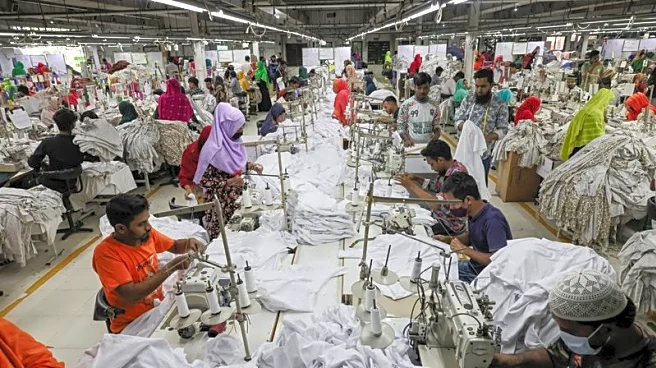What's Happening?
The Senate is set to vote on a measure that would ensure immediate paychecks for federal employees working during the ongoing government shutdown. As the shutdown enters its 20th day, Senate Democrats
are expected to reject a short-term spending measure for the 11th time, which aims to fund agencies through November 21. Senate Republicans, led by Majority Leader John Thune, are pushing for a bill introduced by Sen. Ron Johnson that would provide immediate pay to 'excepted' employees, those deemed necessary to protect life or property. These employees are currently working without timely compensation, relying on food banks and side jobs to manage their expenses. The bill seeks to alleviate one of the shutdown's central issues by ensuring these workers receive their paychecks on time.
Why It's Important?
The proposal to pay federal workers immediately during the shutdown is significant as it addresses a major pain point for those affected. Nearly 700,000 federal employees are furloughed, while about 1.5 million are working without timely pay. Ensuring immediate pay could reduce absenteeism and financial strain, potentially easing the path to a resolution. However, Democrats express concerns that the measure gives President Trump excessive discretion over who gets paid, potentially undermining congressional authority. The outcome of this vote could influence the duration of the shutdown and impact negotiations for a broader funding agreement.
What's Next?
If the Senate passes the immediate-pay bill, it remains uncertain whether the House will take it up for a vote. House Speaker Mike Johnson has not committed to advancing the bill, and Minority Leader Hakeem Jeffries has criticized it as a political maneuver granting President Trump undue power. The Senate's decision could pressure the House to act, but the broader issue of reopening the government remains unresolved. The potential for a 'long-term continuing resolution' looms, as lawmakers may struggle to negotiate full-year appropriations in time.
Beyond the Headlines
The debate over immediate pay for federal workers during the shutdown highlights broader issues of executive power and congressional authority. The measure's critics argue it could set a precedent for the president to selectively decide compensation, raising concerns about fairness and transparency. Additionally, the shutdown's impact on federal employees underscores the vulnerability of public sector workers during political impasses, prompting discussions on the need for more robust protections and contingency plans.












